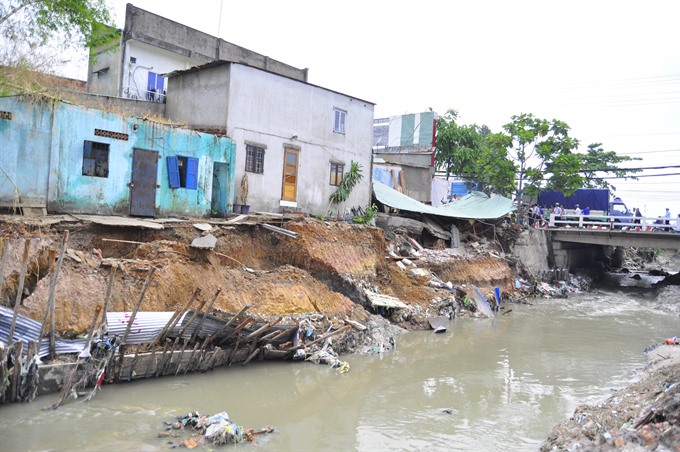 Society
Society

Modest funding, capacity and quality of planning are major challenges that Vietnamese cities are facing in the response to climate change, experts shared at yesterday workshop on sustaining urban resilience in Việt Nam.
 |
| A residential area in Biên Hòa City, southern Đồng Nai Province is threatened by landslind along river. About 300 out of 800 cities in Việt Nam are said to be at risks of climate change’ impacts including extreme heavy rain, storm, landslide and flood. — VNA/VNS Photo Công Phong |
HÀ NỘI — Insufficient funding, capacity and planning quality are major challenges facing Vietnamese cities in response to climate change, experts shared at a workshop on sustaining urban resilience in Việt Nam.
The workshop was organised on Thursday by the Institute for Social and Environmental Transition (ISET), the country co-ordinator for the Asian Cities Climate Change Resilience Network (ACCCRN) programme in Việt Nam.
Đào Anh Dũng, vice chairman of Cần Thơ City People’s Committee, said the city saw climate change cause erosion, storms and saltwater intrusion. However, he admitted that the city was still in dire need of knowledge, experience and competent staff to deal with it.
Response to climate change’s impacts requires multiple sectors, provinces and nations, but legal policies and joint action plans among localities are not clear and detailed, he said.
Dũng’s counterpart in Bình Định Province, Phan Cao Thắng, added that it has yet to be resolved how to harmonise today’s socio-economical growth with tomorrow’s sustainable development.
The local government is struggling to arrange funding for climate change response projects, as they usually require huge investment — for example, dyke systems.
Michael DiGregorio, country representative of the Asia Foundation in Việt Nam, said that it seems people in the country do not want to deal with climate change because they do not know what they could do. Therefore, much more communication is needed.
He also said that although there is decentralisation in authority in Việt Nam, there is not decentralisation in funding and taxing. Therefore, local governments hardly impose their own taxes to balance their spending and serve their priorities.
Lưu Đức Cường, vice director of Việt Nam Institute for Urban and Rural Planning, said that the country has about 800 cities--300 of which were deemed vulnerable to climate change. Thousands of urban planning proposals are made yearly, but the quality of such planning is modest.
“The way planning is made in Việt Nam is outdated, resulting in inflexible plans lacking feedback or contributions from involved parties,” he said.
He added that any current response actions should not only deal with current problems but also consider possibilities for the future to avoid waste.
“The work is difficult. Climate change involves uncertainty, while planning requires certainty,” he said.
Ngô Thị Lệ Mai, Việt Nam’s ISET country co-ordinator, said that in 2009, the Rockefeller Foundation selected three Vietnamese cities – Cần Thơ, Đà Nẵng and Quy Nhơn – together with seven other cities in Thailand, India and Indonesia, to become part of its regional ACCCRN programme worth US$59 million.
The programme provided technical support and capacity building to enable city governments to develop better climate change resilience plans and implement the plans.
ISET’s work at each locality was developed based on local needs and priorities. For example, in Đà Nẵng City, it helped build storm-resistant housing, teach climate change at schools and study the city’s water resources. In Quy Nhơn, it helped with mangrove restoration and early flood warning systems. In Cần Thơ, it conducted projects in salinity monitoring, dengue prevention and management against riverbank erosion.
“A key part of ISET’s approach in designing the ACCCRN programme in Việt Nam is a focus on local engagement and capacity building through involving local partners so that ACCCRN impacts can extend well beyond its timeline and funding to inspire local and national actions as well as support future policies,” said Mai.
She added that the approach is especially important in the uncertain context of climate change and urban development in the country. — VNS




